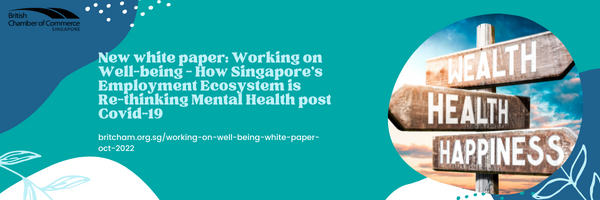BritCham's Healthcare & Life Sciences Committee publishes Mental Health White Paper
In recognition of World Mental Health Day, the BritCham Singapore Healthcare and Life Sciences Committee today launches a significant and detailed research report into how Singapore’s employment ecosystem is re-thinking mental health post Covid-19.
Download the white paper here.
The white paper is the first in a series of three on the wider topic of mental health and sets the scene for the series with a perspective on how the corporate ecosystem is evolving. This will be followed by a second paper on how the search for clinical biomarkers is not only helping to de-stigmatise the way that we approach mental health but is also opening new avenues for diagnosis and treatment. Lastly, they will consider how mental health and well-being is being approached at a community level in Singapore.
In today’s report, entitled ‘Working on well-being', the Committee review the cost of mental health to productivity and health, the impacts and opportunities from technology, Singapore’s unique stressors to mental health, insurance coverage and Government recognition of the issues through the Tripartite Alliances. Stressed employees are less productive in many ways, with costs to themselves, their employers and society at large. Studies quoted within our research indicate that the highest excess costs are associated with higher-demand jobs.
Building on quantitative data points, the Committee interviewed key employers in Singapore, including Dulwich College (Singapore), PwC and Watson Farley & Williams, alongside individual perspectives from employees in varied roles and environments.
Their findings identified several recommendations:
- To reduce the social stigma:
- Reframe the discussion around more positive terminology;
- Use a data-driven approach to deepen understanding and broaden acceptance of mental health and well-being;
- Start young: change the way that children think while they are still at school;
- Enshrine the equivalence of mental health and physical health in law;
- Encourage leaders to lead by example: explaining how they have personally struggled with workplace stress.
- Singapore spends more of its health budget on stress-related illnesses than several of its peers which could be reduced by increasing the number of regulated mental health professionals in the primary care system
- Encouraging insurance companies to include outpatient counselling services within individual and corporate policies, not only those followed by inpatient treatment
Chair of the British Chamber’s Healthcare and Life Sciences Committee and CEO of Medix Global, Sigal Atzmon, said:
“The committee chose this subject because, as healthcare companies and employers ourselves, we're all acutely aware of the impact that anxiety, depression and stress have on health, well-being and productivity. Employers and insurers have a social responsibility to protect their employees’ and customers’ physical and mental health. But it's also one that will benefit their financial health over the short- and long-term too.”
Atzmon added that
“We hope this White Paper stimulates debate in Singapore, where the government has been doing so much to create a mental health eco-system over the past few years and inspires all stakeholders to take action.”
British Chamber of Commerce Singapore Executive Director, David Kelly, said of the research:
“This white paper on the corporate ecosystem surrounding mental health in Singapore is a step forward in illustrating why mental and physical health should be treated equally. I am delighted to see the commitment of the members of our Healthcare and Life Sciences Committee to highlight these issues and to provide new research for World Mental Health Day. The British Chamber of Commerce looks forward to the future white papers in this series with interest, and encourages all organisations and interested individuals to participate in the conversation, raising awareness for the benefit of all.”

